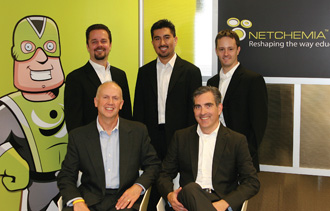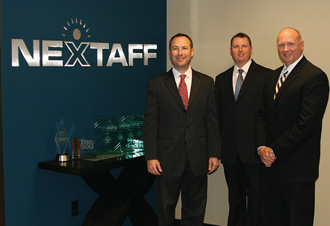
(back row): Graham Forman, Vice President of Sales; Carlos Antequera, Chief Executive Officer; Chris Weber, Chief Software Architect; (front row): Wayne Morgan, PhD., Chief Operating Officer; Eric Diebold, Vice President of Client Success.
Netchemia
Early success for a small business, Carlos Antequera will tell you, can be a trap: If you start seeing unlimited possibilities with product lines or service areas, there’s a mighty urge to go after every dollar out there. You’ll catch some, says the CEO of Netchemia, but you risk losing something more valuable: Focus.
“Sometimes it’s easy to chase revenues or markets, but you have to say, ‘OK, I’m going to be good in this area and focus on this area,” he says. “The normal pace of things as an entrepreneur tends to pull you in the other direction. But you have to trim the edges, if you will, and the most difficult decisions a lot of times are what to cut instead of what to add.”
Antequera and two founding partners, Chris Weber and Eric Diebold, launched the company in 2001. Netchemia’s particular focus was on software to help public schools transition from the huge volumes of paper involved in individualized education plans, teacher recruiting and evaluation, and more. The model worked: Netchemia now serves 325 school districts in 36 states.
Confronted with annual growth of 50 percent or more, Antequera quickly realized what was needed—and it wasn’t just good people. Cohesive performance at Netchemia comes from two dozen good people following six core operating values. He asks each employee to take initiative and deliver exceptional results, act with integrity and hold themselves and others accountable, embrace the entrepreneurial experience, engage in constructive conflict about ideas but fully commit to group decisions, place the company and team over self, and be passionate about the work and lifelong learning.
Those values play a key role at the point of hiring, Antequera said, and are powerful contributors to the culture that has made the company successful. As important as that culture is, Antequera says, it’s vital to realize where your knowledge gaps are, because sometimes, that self-awareness is a matter of organizational life and death.
“None of us when we started this venture had a professional sales background,” he said. “A lot of people behind startups, particularly high-growth companies in technology, normally don’t have sales expertise and don’t necessarily like sales. But it’s critical, because you can have best the products and a good market, and if you don’t have the sales, you don’t get the revenue. You’re not going to get far without those. It’s something that, in the early years, I wish I had realized sooner.”

Cary Daniel, Chief Executive Officer; James Windmiller, Chief Operating Officer; Stacy Wheeler, Vice President of Business Development.
Nextaff
Do you want to succeed in business? Listen to what Cary Daniel offers by way of advice: “Become a master on execution,” says the CEO of Nextaff, a staffing agency headquartered in Overland Park, Kan. “What separates the great from good, the good from average and the average from the dead is execution.”
That’s wisdom gleaned in part from the works of Stephen Covey and Chris McChesney in “The 4 Disciplines of Execution.” And from his experiences in growing a company that reached No. 1 on Ingram’s Corporate 100 in 2007. At that time just a dynamo of five employees, Daniel’s company has more than doubled since, with 11 employees and a dozen offices operating in seven states.
Beyond execution, though, Daniel has relied on people and persistence to get his company where it is. And a healthy dollop of conversation: “You have to verbalize the vision and then talk about it consistently,” says Daniel. “We have changed our business model and completed two acquisitions this year, so it has been very chaotic.”
One way to reduce the stress of rapid growth, he says, has been to carve up the elephant, rather than eating it in one bite: “We have been doing minor goals that lead up to the ultimate vision” and later this year, he’ll roll out the company’s refined vision. “We are implementing a process that will allow us to take consistent steps toward our goals,” he said.
That refinement will likely cleave to a core value that got Nextaff where it is: You don’t win a company’s business if you don’t help improve its productivity. To get there, Nextaff has developed an array of programs that make it more than just a staffing agency—payroll services, employee testing, benefits and 401(k) plan administration, risk management, legal compliance and more all supplement its mission of helping companies set up an effective work force.
But there will be some new wrinkles. The biggest challenge to executing a shared vision across a larger staff, Daniel says, is “changing old habits.” That, and “finding time amidst the day to day whirlwind to spend time on our goals.”